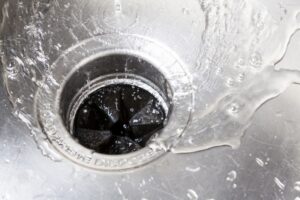Perhaps you’ve had a garbage disposal in the past, or perhaps this is the first time you’ve gotten acquainted with one. Either way, now that you have one, it’s the perfect time to learn about how they work, how to keep yours in good shape, and what to do in the event that something does go wrong.
If you are considering a garbage disposal but haven’t gotten one yet, we’re happy to help with all your garbage disposal installation questions in Northern Virginia.
How a Garbage Disposal Works
Inside your garbage disposal there are rotating parts called impellers. They push the food waste outward, against a grinding wheel, which grinds the food waste into small pieces. These pieces can now easily be washed away with the water. People often make an incorrect assumption that the rotating parts are blades, but in fact they are blunt, simply pushing the food toward the grinder. This does not mean they are not dangerous. Never put your hand into the garbage disposal for any reason! This can cause serious injury.
How to Keep Your Disposal Happy
All you need to know to keep your regular use from causing damage to the mechanism is what not to put down it. There are three categories of items that should be disposed of elsewhere and never put into your sink disposal.
Nonfood Items: Your sink disposal is not for actual garbage. Plastic, metal, paper, cardboard, and other nonfood materials can damage the disposal and should not be put down your drain.
Problematic Food Items: Anything hard and inedible like a peach pit or chicken bone, or anything with tough stringy fibers like corn husks or celery, can cause damage to the disposal. Anything that soaks up more and more water, such as rice or pasta, can cause clogs.
Fat, Oil and Grease: Plumbers sometimes refer to these substances as FOG for short. Although they may be liquid when they are still warm, they solidify at colder temperatures. Grease poured into your disposal can become a solid plug of fat, caking up your disposal and clogging your pipes.
What to Do If a Problem Arises
If something is caught in the impellers and you are hoping to dislodge it, never use your hand. Instead, try using something that keeps your fingers safely away from danger, such as the handle of a broom or a long wooden spoon.
If your disposal smells unpleasant, sprinkle baking soda down it and follow it with vinegar or lemon juice. It will bubble and foam, deodorizing everywhere it reaches. A few minutes later, rinse it all down with water.
A common misconception is that grinding ice cubes in a sink disposal will sharpen the blades. This is wrong in two ways: first, there are no blades; and second, striking a substance as hard as ice can damage, not sharpen, the internal mechanism.
If you feel that the disposal is not grinding as well as it should, if a foul odor lingers even after using baking soda and vinegar, or if something is lodged in it and you can’t safely remove it, repair by a qualified, experienced technician is in order.
AllTech Services, Inc. is your trusted resource for quality Northern Virginia Garbage Disposal Installation. Contact us today!


